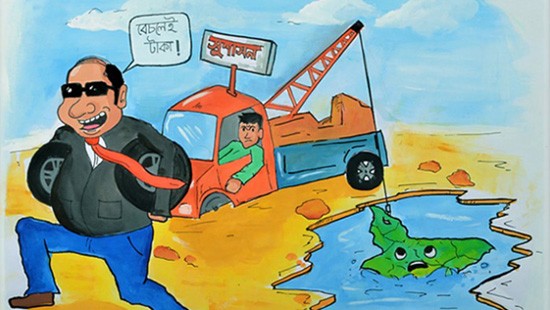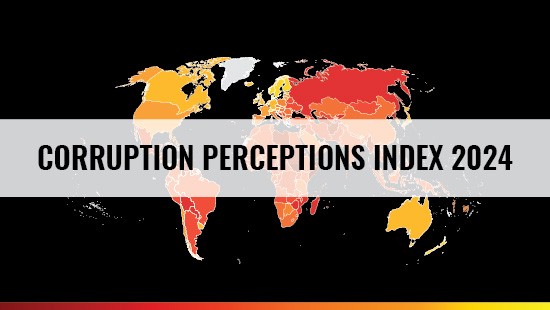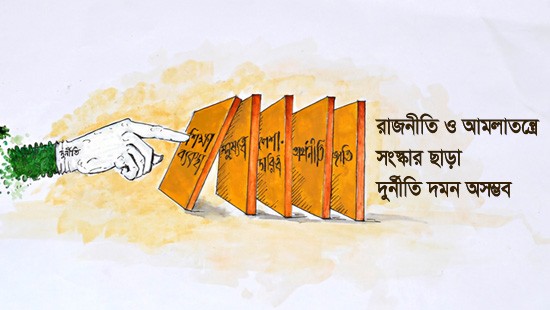Published: 12 January 2014
The time for our leaders to mobilise political capital putting the people first is now. It has for too long been about politics of power, be that deadly, unpleasant and embarrassing. The zero-sum game for power, caring precious little about public interest, has become extremely expensive by all indicators. It has invited newer forms of ruthless violence including petrol bombs, attacks on infrastructure, targeted attacks on minorities causing loss of innocent lives, and breach of people's rights.
What we have seen in the name of election to the 10th Parliament is a brazen exposure of how prospect of democracy and public interest can be undermined. Overwhelming majority of voters were deprived of the right to vote. Fundamental rights of the top leaders and workers of the opponents were violated blatantly; who, in their intransigence, resorted to unprecedented violence and mayhem introduced in the culture of hartal and oborodh. As if it was the end of history for both sides.
We have already written in this column that nobody has truly won the January 5 election. We also wrote that while constitutionality and legality of the election cannot be challenged, its political and moral credibility will remain questionable. That the new parliament and government are not considered to have achieved public mandate, nor was it even intended to be in terms of election manifesto, has been recognised at high level.
The election has helped violent, undemocratic, dogmatic and fundamentalist forces to gain ground in the political space rather menacingly. The cost of political intransigence is skyrocketing, not least in the form of despair and fear among common people. For kids and youngsters politics is about destroying educational infrastructure including burning of schools and books; it is about barring them from attending school or examination. Politics is being depicted to them as a game of killing and burning people, and as a means of getting money and muscle. It is about depriving the common people of their right to life and liberty. There are certainly a lot of politicians for whom all these are unacceptable, but who other than our leaders can take the responsibility for creating worst enemies of politics from within?
There is apparently no light at the end of the tunnel. Still, the January 5 election and the 10th Parliament being fait accompli, as the prime minister said more than once, she may now come up with a specific time-bound roadmap for negotiation for a mutually agreeable election time government for an inclusive 11th Parliament election. But whether or when it will happen is anybody's guess. The longer it takes, the more unlikely it will be.
Moreover, given the bad blood between the two top leaders is there is any incentive for a negotiated settlement? Not really, unless the BNP takes a genuine hard look at its strategy assessing what it has gained and lost in the whole period of the 9th Parliament against what its strengths and witnesses are. Isn't it in BNP's interest to renounce the violent forms of hartals and oborodhs holding people hostage? Shouldn't they reassess organisational strength, expectation of the party rank and file and public support to be of much greater value than dependence on undemocratic, militant and dogmatic forces? Shouldn't they take a clearer stance vis a vis war crime trial? By so doing they stand to gain more in terms of regaining political capital.
The need for political capital is no less pressing for AL either. Shouldn't they reassess the cost and benefit of denying fundamental rights of the leaders and workers of BNP? By stopping such acts and making a genuine call for dialogue with a time-bound roadmap AL can take a vital step for building political capital.
As the new government is formed, it stands to gain politically by responding positively to the public outcry that those who have been alleged of rampant corruption, including unprecedented amassing of wealth by abusing entrusted power, be excluded from the cabinet and brought to justice without fear or favour. Can we expect enactment of stricter legal provisions to prevent conflict of interest in government and politics?
However long the 10th Parliament lasts, it will suffer from ineffectiveness. There will probably be no parliamentary boycott, but it will have the dubious distinction of having no opposition at all, or at best a kangaroo opposition unless the handful of independent MPs remain so and fill in the gap to the extent possible. There will be practically hardly any standing committees worth the name. Will MPs of the 10th Parliament, barring exception of those from constituencies where voter turn-out was somewhat enthusiastic for one or other reason, truly deserve the privileges and powers at the expense of public money?
At the core of the crisis the nation faces is power-centric election. Nevertheless, only election can hardly resolve it. National consensus must be achieved on a number of key issues if accountable governance is to be institutionalised. On top of the list should be the proposal for proportionate voting system along with re-introduction of no-vote option and abolition of the practice of electoral coalition. The balance of power between president and prime minister must be reviewed, with particular emphasis on checks and balances on the authority of the chief executive, including limiting the tenure of this office to a maximum of two consecutive terms. The practice of holding the position of head of the government and leader of the opposition parallel with that of the respective party must be abolished.
A specific law should be enacted to stop boycott of parliament. The bill on Code of Conduct of MPs must be adopted and enforced. Deputy speaker of the Parliament should be elected from the opposition. Specific set of reforms are needed, including review of Article 70 of the Constitution, to facilitate democratic practice within political parties.
A code of conduct of hartal and oborodh must be adopted and enforced so that, in the exercise of political rights, fundamental rights of citizens are not affected. A permanent commission on rights of religious minorities and indigenous communities should be established with the mandate to review the factors and processes of discrimination, including the drastic fall of the ratio of minority population since independence, and to identify the beneficiaries of the process and bring them to justice. It should examine the plight of indigenous peoples, including failure to ensure constitutional recognition and non-implementation of the CHT Accord.
Above all, the growing trends towards kleptocratic state, capture and institutionalisation of amassing disproportionate wealth and income by abusing office of government and public representation must be uprooted by a duly designed anti-corruption strategy. The ever-increasing partisan influence on key institutions like administration, law-enforcement agencies, justice, Anti-corruption Commission, Election Commission must be stopped.
The catalogue is open-ended, and may be perceived to be a wish-list. As much as these may look unrealistic, the sooner our leaders consider such issues as their genuine agenda the better will be the prospect of building their pro-people political capital.
Iftekharuzzaman. Executive Director, Transparency International Bangladesh (TIB).
Published on 12 January, 2014 in the Daily Star. Link







